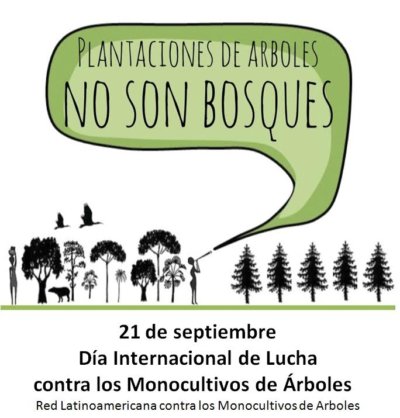09 de Septiembre de 2015




Desertificación / Monocultivo / Plantaciones industriales de árboles / Degradación de suelos /
Internacional - Desertificación
Informe: Cómo las políticas y las agencias sobre bosques promueven la destrucción sostenible (18/03/2022)
Informe internacional de expertos en cambio climático y mega sequía: Alarmante situación en Chile (07/02/2022)
Día Internacional de Lucha contra los Monocultivos de Árboles – 21 de setiembre de 2020 (20/09/2020)
Conversatorio sobre las Luchas Contra los Monocultivos de Arboles en Latinoamérica (19/09/2020)
21 de Septiembre: Día Internacional de Lucha contra los Monocultivos de Árboles (21/09/2018)
Impactos en el agua de las plantaciones industriales de árboles (08/10/2016)
Día Internacional de Lucha contra los Monocultivos de Árboles (21/09/2016)
International Day of Struggle against Monoculture Tree Plantations (19/09/2015)
Llamado a la Acción para rechazar REDD y las industrias extractivas (30/08/2015)
Desertificación
Documental “La Fiebre del Litio: las Sombras de la Transición Energética”. Chile (15/05/2025)
Amplias evidencias muestran el devastador impacto de las forestales en Wallmapu y la Cordillera de la Costa. Chile (12/07/2021)
Proyecto inmobiliario amenaza con destruir el ecosistema del Bosque Panul. Chile (19/03/2021)
Instructivo para proteger bosque nativo ante arremetida de agroindustria. Chile (18/06/2020)
Pueblo sin agua, pueblo muerto: la advertencia del Acta de Tarapacá sobre la sobreexplotación del Desierto de Atacama. Chile (26/07/2018)
Monocultivo
El ambicioso plan de expansión forestal que amenaza Chile: 1 millón más de hectáreas de pino y eucalipto. Chile (05/09/2025)
GloNi: Los eucaliptos híbridos que busca expandir el gran empresariado forestal en Chile. Chile (29/08/2025)
Red por la superación del Modelo Forestal realizó su 5to encuentro presencial en Los Ángeles. Chile (03/09/2024)
El impacto de las plantaciones forestales en los ecosistemas de Chile. Chile (23/05/2024)
Organizaciones internacionales recogieron evidencias de impacto del monocultivo forestal en el centro-sur de Chile. Chile (03/05/2024)
Gran empresariado forestal: lloriqueo y lágrimas de cocodrilo. Chile (13/04/2024)
Delegación internacional visitará Chile y Wallmapu para analizar impactos de monocultivo forestal. Chile (26/03/2024)
La lucha por la tierra en la Amazonía brasileña contra las empresas mineras y de palma aceitera. Brasil (26/02/2024)
Plantaciones industriales de árboles
Imágenes de la destrucción del bosque nativo con el incendio forestal en Penco: ¿Qué pasó con los queules?. Chile (09/02/2026)
“Si una actividad existe para generar utilidades, también debe asumir íntegramente los costos y riesgos que genera”. Chile (23/01/2026)
Organizaciones del Biobío se autoconvocan ante la emergencia por mega incendios: La vida, el agua y los territorios están siendo devastados. Chile (20/01/2026)
El ambicioso plan de expansión forestal que amenaza Chile: 1 millón más de hectáreas de pino y eucalipto. Chile (05/09/2025)
GloNi: Los eucaliptos híbridos que busca expandir el gran empresariado forestal en Chile. Chile (29/08/2025)
Realizan encuentro sobre impactos del monocultivo forestal en el Biobío. Chile (18/05/2025)
Empresas forestales se benefician con más de $70 mil millones gracias a subvenciones de CORFO y exenciones tributarias por Ley I+D. Chile (20/02/2025)
La pesadilla de ser vecino de la planta de celulosa más grande de Chile. Chile (26/11/2024)
Ver más:
Desertificación / Monocultivo / Plantaciones industriales de árboles / Degradación de suelos /